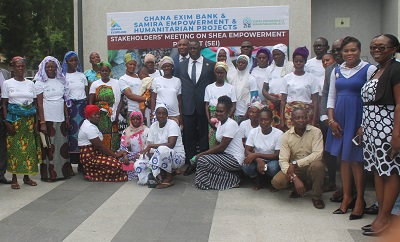
Stakeholders in the shea industry met yesterday to collate relevant views and suggestions on how to successfully execute the Shea Empowerment Initiative (SEI).
The initiative aimed at economically empowering women engaged in the shea value-chain in the northern parts of Ghana is being funded by the Ghana Export-Import Bank (GEXIM) with support from the Samira Empowerment and Humanitarian Project, an NGO focused on empowering women and development of the shea industry.
Mr Lawrence Agyisam, the Chief Executive Officer(CEO) of the bank said the project would not only provide financial assistance to operators but practical capacity training schemes to quicken the development of rural economies of Ghana to promote sustainability, quality practices and standards.
The bank he said was committed to enhancing the growth of the shea industry in Ghana hence the investment would be translated into the training of 1,600 women, providing of safety tools, and a furnished shea processing centre which intends to create direct jobs for the local women.
“This initiative will increase value-addition of shea and increase export of shea butter and it will be a catalyst for wealth creation,” he said.
Mr Agyisam said reports from COCOBOD showed that, out of the 200 million-dollar profits recorded by shea in 2017, Ghana was able to rake in $70 million, adding that shea products were the second non-traditional food crop in Ghana with over 300,000 farmers benefiting from the entire food chain.
The CEO assured partners such as Global Shea Alliance and others of its unflinching support towards achieving the government agenda of One District One Factory.
He commended the women collectors whose toils had carried the industry very far and called for their full inclusion and participation in the shea value chain.
A representative from Shea Empowerment Project, Bright Darko, in his submission said shea was a primary source of livelihood for women in northern Ghana and is one of the few agricultural crops where women control the revenue.
He said for the first phrase, the initiative would provide employment to women from four districts namely Walewale, Wa, Gushegu and Kasena Nenkana.
By BENEDICTA GYIMAAH FOLLEY and MALISA TETTEH






